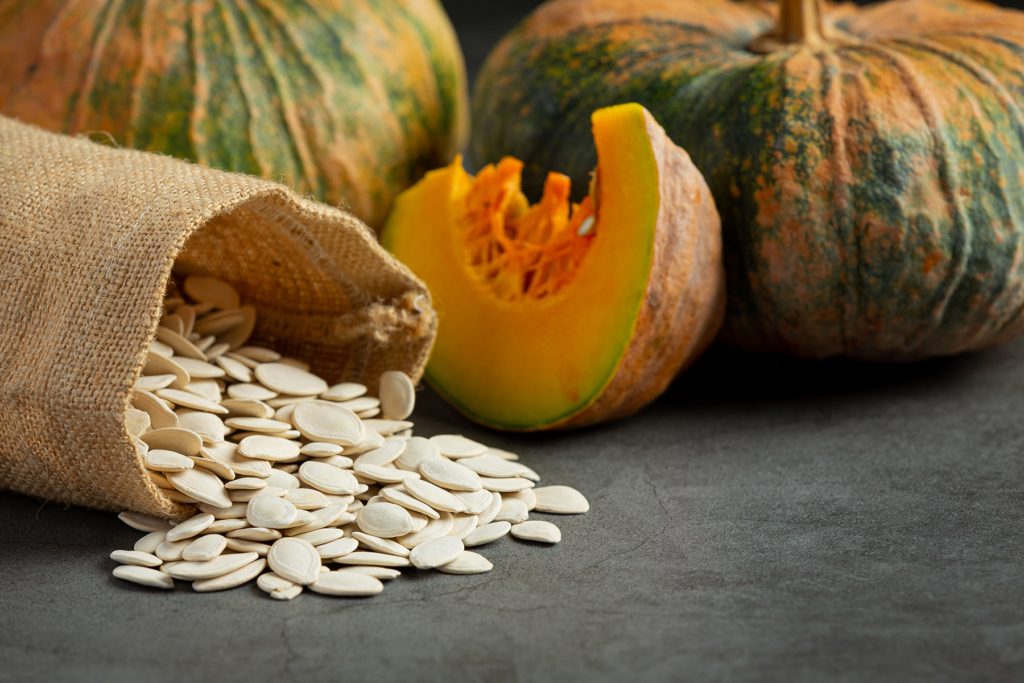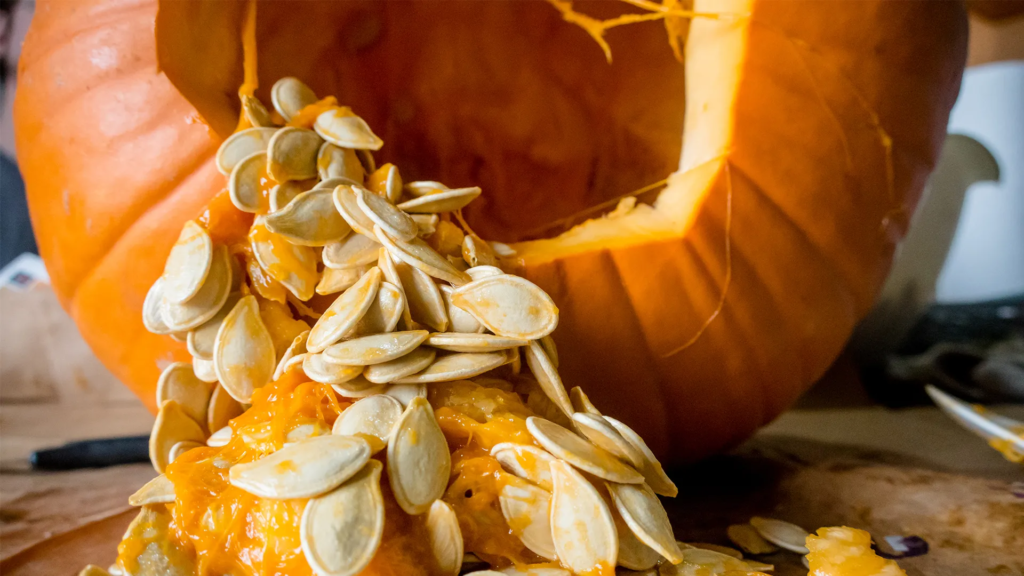
Pumpkin seed, also known as pepitas, are more than just a leftover from carving jack-o’-lanterns. These tiny nutritional powerhouses are packed with an impressive array of vitamins, minerals, and healthy fats, making them a popular snack and a versatile ingredient for health-conscious individuals.
But what exactly are pumpkin seeds, and how can they benefit your health? Buckle up as we delve into the world of pumpkin seeds, exploring their nutritional profile, health benefits, and culinary uses, and even answering some of the most commonly asked questions people have been searching for online.
A Seed with a History: From Gourd to Superfood
Pumpkin seeds come from pumpkins and other winter squash varieties. These flat, oval-shaped seeds have a creamy white hull and a light green inner kernel. While the hull is technically edible, it’s often removed for a smoother texture. Pepitas, a term derived from Mexican Spanish, typically refers to pumpkin seeds with the hull removed.
Pumpkin seeds have been a valuable food source for centuries. Evidence suggests they were consumed by indigenous people in North America and Mexico as early as 7,000 years ago. Today, pumpkin seeds are cultivated worldwide and enjoyed for their delicious taste and impressive health benefits.
Cracking the Code: Nutritional Powerhouse of Pumpkin Seeds

Pumpkin seeds are a nutritional goldmine, boasting a rich profile of vitamins, minerals, healthy fats, and protein. A single one-ounce serving (about 28 grams) of shelled pumpkin seeds packs a punch with:
- Calories: 160
- Carbs: 3 grams
- Protein: 8.6 grams
- Fat: 14 grams (including healthy monounsaturated and polyunsaturated fats)
- Fiber: 1.7 grams
- Manganese: 56% of the Daily Value (DV)
- Copper: 42% of the DV
- Magnesium: 40% of the DV
- Phosphorus: 28% of the DV
- Zinc: 20% of the DV
- Iron: 14% of the DV
- Vitamin K: 18% of the DV
This impressive nutrient profile contributes to a wide range of potential health benefits.
Unveiling the Health Benefits of Pumpkin Seeds
The power of pumpkin seeds goes beyond their delicious taste. Research suggests they offer a variety of health benefits, making them a worthy addition to a balanced diet.
- Heart Health Hero: Pumpkin seeds are rich in healthy fats, particularly monounsaturated and polyunsaturated fats. These fats can help lower LDL (“bad”) cholesterol levels and increase HDL (“good”) cholesterol levels, promoting overall heart health.
- Boosts Blood Sugar Control: Pumpkin seeds contain fibre, which helps regulate blood sugar levels by slowing down the absorption of carbohydrates. This can be beneficial for people with diabetes or prediabetes.
- Zinc Powerhouse for Men’s Health: Zinc is an essential mineral for male reproductive health. Pumpkin seeds are a rich source of zinc, which may improve sperm quality and prostate health.
- Natural Sleep Aid: Pumpkin seeds contain tryptophan, an amino acid that converts to serotonin, a neurotransmitter that regulates sleep. Additionally, pumpkin seeds are a good source of magnesium, which can also promote relaxation and better sleep.
- Antioxidant Power: Pumpkin seeds are loaded with antioxidants that help fight free radicals in the body. Free radicals can damage cells and contribute to chronic diseases like cancer and heart disease. The antioxidants in pumpkin seeds may help protect against these conditions.
- Improved Bone Health: Pumpkin seeds are a good source of minerals like magnesium, phosphorus, and zinc, all of which are essential for maintaining strong bones. Including pumpkin seeds in your diet may help prevent osteoporosis.
These are just some of the potential health benefits associated with pumpkin seeds. As research continues, we may discover even more ways these tiny seeds can contribute to our well-being.
FAQs
Q. What are pumpkin seeds and where do they come from?
Pumpkin seeds are the edible seeds of a pumpkin. They come from the fleshy centre of the pumpkin and are typically flat, oval, and green. While you can harvest seeds from your pumpkins, most store-bought pumpkin seeds are already shelled and roasted for convenience.
Q. Are pumpkin seeds healthy?
Absolutely! Pumpkin seeds are a great source of plant-based protein, healthy fats like omega-3s, and essential minerals like magnesium, zinc, and iron [1, 2, 3]. They’re also high in antioxidants which can help protect your cells from damage.
Q.What are the benefits of eating pumpkin seeds?
Pumpkin seeds offer a range of potential health benefits, including:
- Improved heart health: The healthy fats in pumpkin seeds can help lower bad cholesterol and improve blood pressure.
- Boosted mood and sleep: Pumpkin seeds are a natural source of tryptophan, which your body converts to serotonin and melatonin, neurotransmitters that regulate mood and sleep.
- Prostate and bladder health: Pumpkin seeds may help ease symptoms of an enlarged prostate and overactive bladder.
Q. How can I incorporate pumpkin seed into my diet?
Pumpkin seeds are a versatile ingredient! Here are some ideas:
- Snack on them raw, roasted, or flavoured (think cinnamon, chilli lime, or everything bagel seasoning!)
- Sprinkle them on salads, soups, yoghurt, or oatmeal
- Use them as a breading or crust for chicken or fish
- Add them to homemade granola bars or energy bites
- Blend them into smoothies for a protein and nutrient boost
Q. How many pumpkin seed should I eat per day?
A serving of pumpkin seed is around 1 ounce (28 grams). This provides a good amount of nutrients without going overboard on calories.
Q. Can pumpkin seeds go bad?
Yes, pumpkin seeds can go rancid if not stored properly. Store them in an airtight container in the refrigerator for up to 3 months, or the freezer for longer storage.
Q. Where can I buy pumpkin seed?
You can find pumpkin seed at most grocery stores, in the nut and seed section or in bulk bins.
Q. Do pumpkin seeds have any side effects?
Pumpkin seeds are generally safe for most people, but eating too much can cause digestive issues like gas and bloating. Additionally, people with allergies to nuts and seeds should be cautious, as pumpkin seed allergies can exist.
Q. Can pumpkin seeds help me sleep?
The tryptophan content in pumpkin seeds may indirectly contribute to better sleep by promoting the production of melatonin. However, more research is needed to confirm this benefit.
Q. Are pumpkin seeds good for your skin?
The antioxidants and healthy fats in pumpkin seeds may contribute to overall skin health, but more research is needed to determine the direct impact.
So there you have it! Pumpkin seeds are a delicious and nutritious snack that can easily be incorporated into your diet. With their potential health benefits and versatility, pumpkin seeds are tiny seeds with a mighty punch!
To read more, Click here
